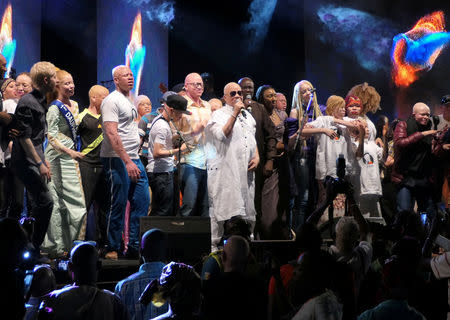Mali singer Salif Keita highlights plight of African albinos
By Fadima Kontao and Tim Cocks
BAMAKO/DAKAR (Reuters) - Like many people, Malian musician Salif Keita first became aware he was different when he started school. His skin was white; all the other kids were black.
"I was the sole albino," he told Reuters in an interview. "I knew immediately that I was different from the other children."
Across Africa, the skin condition -- where people are born with no pigment in their skin, eyes and hair -- is often seen as an omen of misfortune. Albinos have been shunned, ostracised, beaten, killed, and in some places dismembered so their body parts can be used for magic potions.
But when 5-year-old albino girl Ramata Diarra was ritually killed and beheaded in the Malian town of Fana, 130 km west of the capital Bamako, in May this year, Keita decided to act.
"I was truly shocked," he told Reuters before throwing a concert in Fana on Saturday as a tribute to Ramata.
"Albinos have problems integrating into society, which is something we wanted to expose," he said. "We are saying that beauty lies in difference. We must be proud of what we are."
His new album "Un Autre Blanc", or Another White -- the last before the 69-year-old retires -- is dedicated to underscoring this message.
For decades, Keita's sound -- a hip-shaking yet curiously haunting blend of Mandinka folk music with a percussive jazz- funk -- has delighted West African and Western audiences alike.
The new album is more eclectic than past ones, featuring collaborations with guests as diverse as French rapper MHD, Nigerian Afropop singer Yemi Alade and South African choral group Ladysmith Black Mambazo. "It was my way of saying goodbye, doing this with my friends," he told Reuters.
At Saturday's concert, Fana's football stadium was crammed with revellers carrying slogans like "never again," and "I am Ramata". Albinos danced alongside everyone else.
"She wasn't even old enough for school yet," Ramata's mother Hawa Toure told Reuters, choking back tears. "I will always have this pain in me."
But she hoped the concert would help tackle ignorance.
"If everyone agrees to see albinos as human beings, it becomes a fact," Toure said. "Salif's concert is a cry of the heart to make reason heard."
(Editing by Kirsten Donovan)

 Yahoo Finance
Yahoo Finance 

